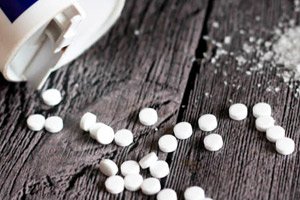
All iLive content is medically reviewed or fact checked to ensure as much factual accuracy as possible.
We have strict sourcing guidelines and only link to reputable media sites, academic research institutions and, whenever possible, medically peer reviewed studies. Note that the numbers in parentheses ([1], [2], etc.) are clickable links to these studies.
If you feel that any of our content is inaccurate, out-of-date, or otherwise questionable, please select it and press Ctrl + Enter.
Artificial sweetener sucralose may reduce effectiveness of cancer treatments
Last reviewed: 03.08.2025

Sucralose is a popular sugar substitute for people watching calories or blood sugar, but a new study from the University of Pittsburgh and UPMC Hillman Cancer Center suggests the artificial sweetener may not be the best choice for patients undergoing cancer immunotherapy.
A study published in the journal Cancer Discovery found that patients with melanoma and non-small cell lung cancer who consumed high levels of sucralose had a poorer response to immunotherapy and lower survival rates than those who consumed little of the artificial sweetener.
Remarkably, supplements that boosted levels of the amino acid arginine mitigated the negative effects of sucralose on immunotherapy in mice, an approach that could now be tested in clinical trials.
“It’s easy to say, ‘Stop drinking diet soda,’ but when patients are going through cancer treatment, they’re already dealing with so many issues that asking them to make drastic dietary changes may be unrealistic,” said lead author Abby Overacre, Ph.D., assistant professor of immunology at the University of Pittsburgh and UPMC Hillman.
"We need to meet patients where they are. That's why it's exciting that arginine supplements could be a simple way to counteract the negative effects of sucralose on immunotherapy."
Senior author Diwakar Davar, MD, assistant professor of medicine at the University of Pittsburgh and a hematologist-oncologist at UPMC Hillman, worked with Overacre and his team to show in mouse models that the negative effects of sucralose are caused by disruption of the gut bacteria.
Sucralose altered the composition of the mice's gut microbiome, increasing the number of arginine-degrading bacteria, which reduced levels of the amino acid in the blood, tumor fluid, and feces.
Immunotherapy with checkpoint inhibitors, such as anti–PD-1, works by boosting the activity of T cells so that they are more effective at destroying cancer cells. Arginine is essential for T cell function, especially in cancer.
“When arginine levels were reduced due to sucralose-mediated microbiome shift, T cells were unable to function properly,” Overacre said. “As a result, immunotherapy was less effective in mice treated with sucralose.”
In mouse models of adenocarcinoma and melanoma, adding sucralose to the diet suppressed the effects of anti–PD-1 therapy, leading to greater tumor growth and worse survival. But when the researchers gave sucralose-treated mice arginine or citrulline (which is converted to arginine in the body), the immunotherapy’s effectiveness was restored.
To assess the relevance of these findings to people, the researchers examined data from 132 patients with advanced melanoma or non-small cell lung cancer who were receiving anti-PD-1 therapy alone or in combination with chemotherapy. The patients completed detailed dietary history questionnaires, including questions about how often they consumed artificial sweeteners in coffee, tea, and diet soda.
“We found that sucralose reduced the effectiveness of immunotherapies across different cancer types, stages, and treatment regimens,” Davar said. “These observations raise the possibility of developing prebiotics, such as targeted nutritional supplements, for patients consuming high levels of sucralose.”
The researchers hope to launch a clinical trial to study whether citrulline supplements—which boost arginine levels better than arginine itself—impact the composition of the microbiome and the anti-tumor immune response in patients.
They also plan to study how other sweeteners, such as aspartame, saccharin, xylitol and stevia, affect the immune system and response to immunotherapy.
